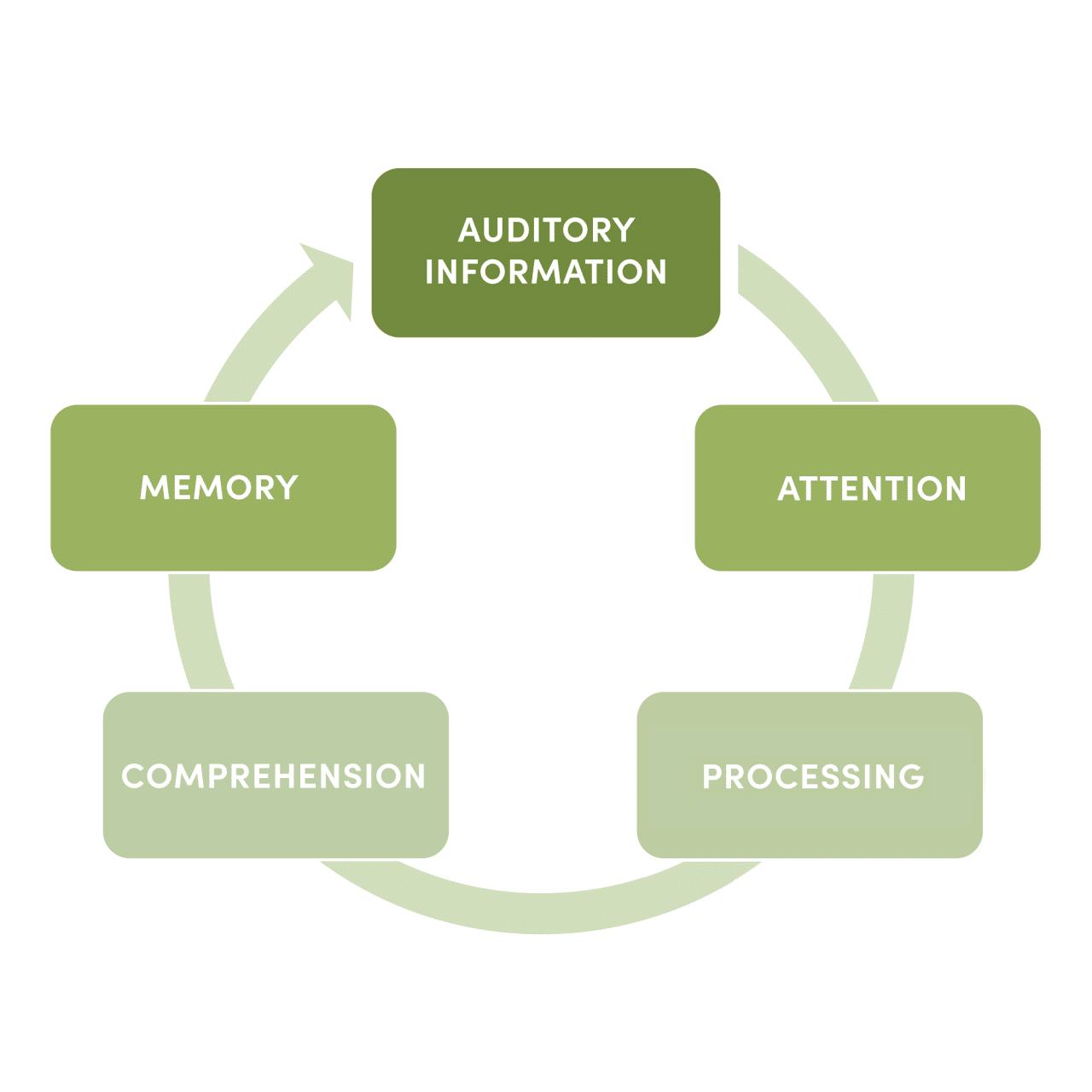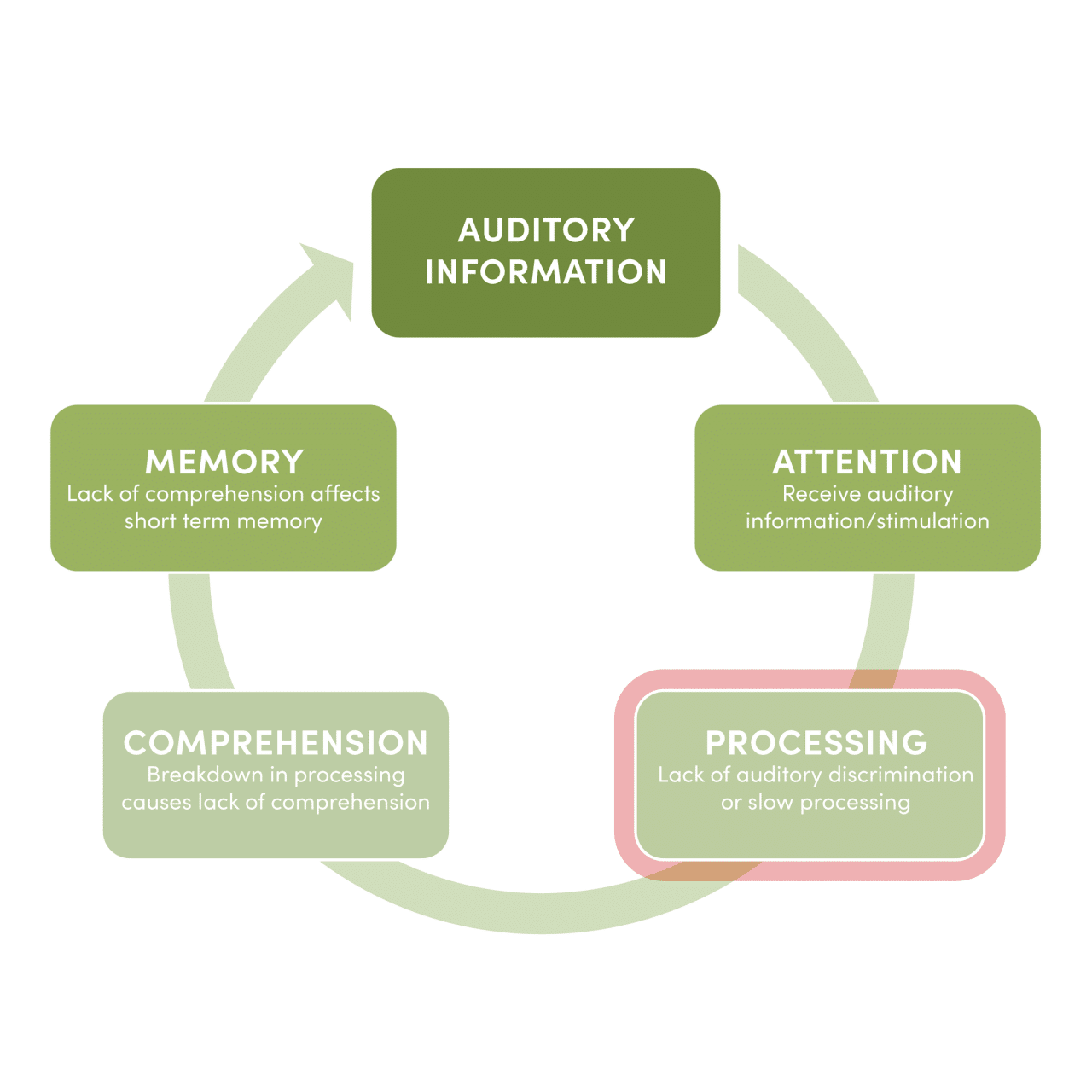
Auditory processing disorder (APD) is diagnosed by an audiologist through a comprehensive battery of tests that are designed to simulate listening tasks encountered in the real world. APD is not a problem with auditory acuity. People with an auditory processing disorder may demonstrate or experience difficulty with attaching meaning to what is heard. Typical manifestations include poor speech-in-noise skills, sound blending, and discrimination difficulties, auditory overload, difficulty with phonics, spelling and writing activities, as well as memory issues, coordination difficulties, problems beginning tasks, poor perception and use of prosody, difficulty with pattern recognition, and trouble understanding and using symbolic language.
Children who “pass” their hearing screening at school or in their pediatrician’s office, do “ok” even when tested by the speech therapist at school, but struggle with long assignments, following directions, appear to not hear (ask for frequent repetitions) or “mishear”, misunderstand humor and idioms, or appear distracted or overly fidgety, may actually be manifesting signs of an auditory processing disorder.


A person with APD will often have trouble focusing on schoolwork, multi-task instructions, and surprisingly even everyday socializing. People tend to retreat in social scenarios so as not to make any mistakes that will permit them to be ridiculed. Their self-esteem can be greatly affected.
APD has been a controversial diagnosis in the medical field. Many people with APD will also have accompanying learning differences that are often diagnosed as the primary problem and therefore APD is overlooked and not properly treated. There are also some medical experts who argue that APD does not exist at all. However, the American Speech-Language-Hearing Association (ASHA), as well as the American Academy of Audiology, have presented position statements in which they present the existence of APD among children as well as adults.
Signs of APD often appear at a young age, usually in school-age children but can be diagnosed in high school children and adults as well. However, it is very important to understand that APD cannot be diagnosed by a checklist. Every person is different and his/her symptoms will manifest themselves differently.
Due to some overlap in symptoms, many children are misdiagnosed with ADD (Attention Deficit Disorder) or ADHD (Attention Deficit Hyperactivity Disorder) as well as other underlying conditions. The truth is that many children will have one of these disorders and delays in addition to APD, but APD can only be diagnosed by a certified audiologist after a series of specifically designed tests.
Symptoms Of APD Can Manifest In Many Different Ways And Can Range From Mild To Severe.
Some Symptoms Of APD Include, But Are Not Limited To:
- Difficulty understanding in noisy environments
- Difficulty following multi-task directions
- Difficulty distinguishing between similar sounds
- Language and/or speech delays
- Often requiring repetition or clarification (as if there was a hearing problem present)
- Easily distracted or unusually bothered by loud or sudden noises
- Improved behavior and performance in quieter settings
- Difficulty understanding abstract information
- Difficulty with verbal math problems
- Disorganized and forgetful
- Have trouble or display poor memory for word and numbers
- Have trouble understanding jokes, riddles or idioms
- Show difficulty in expressive language
- Seems to “tune out” when the conversation is complex or involves too many people
- In school, they will often have difficulties with language, learning, reading and spelling
- If your child has any of these symptoms and you suspect that APD may be the cause, contact a certified audiologist to make an appointment for an evaluation. Keep in mind however, that not all audiologists work with APD testing.
What Causes APD?
Research suggests that it can be congenital (some people are born with it) or it can be acquired. Evidence suggests links to recurring middle ear infections, head injury or trauma, cognitive decline, and reduced language stimulation during early development.
If I Have A Child With ADP, How Can I Help Them At Home?
- Always talk to your child face to face; try to get him/her to look you in the eyes when talking or when giving out instructions.
- Make instructions simple, no more than three steps at a time. If possible, have him/her repeat the instructions back to you.
- Speak at a slightly lower rate and a slightly louder volume.
- When you are in the car and unable to face your child, turn off the radio when carrying on a conversation. This will eliminate background noise so that your child can fully concentrate on the topic at hand.
- When doing homework, have your child sit in a quiet place (no TV, radio, computer, etc) in order for him/her to concentrate.
- Try placing felt stickers on the bottom of chairs to avoid loud noises when they are moved (tennis balls will also work for the noise but not for the decor!)
Call Speech & Hearing Associates at (800) 742-7551 for more information or to schedule an appointment.